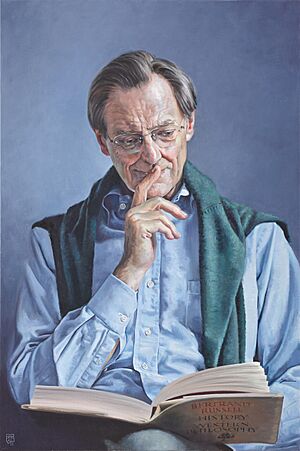Quentin Skinner facts for kids
Quick facts for kids
Quentin Skinner
|
|
|---|---|

Skinner by David Cobley (2011)
|
|
| Born |
Quentin Robert Duthie Skinner
26 November 1940 Oldham, England
|
| Alma mater | Gonville and Caius College, Cambridge |
|
Notable work
|
|
| Spouse(s) |
|
| Awards |
|
| Scientific career | |
| Institutions |
|
| Doctoral students |
|
| Influences |
|
| Influenced |
|
Quentin Robert Duthie Skinner (born November 26, 1940) is a famous British historian. He studies intellectual history, which means he looks at how ideas have changed over time. He is known for helping to start the Cambridge School of political thought. This is a way of studying how political ideas developed.
Skinner has won many awards for his work. These include the Wolfson History Prize in 1979 and the Balzan Prize in 2006. From 1996 to 2008, he was a special professor of history at the University of Cambridge. Today, he is an Emeritus Professor at Queen Mary University of London.
Contents
Quentin Skinner's Life
Quentin Skinner was born in Oldham, England, in 1940. He was the second son of Alexander and Winifred Skinner. Even though his family was from Scotland, he grew up in England.
Early Education and College
He went to Bedford School from a young age. Like his older brother, he earned a scholarship to Gonville and Caius College, Cambridge. He studied history there and graduated with top honors in 1962.
After college, Skinner became a teaching fellow at Christ's College, Cambridge. He stayed there for many years. Later, he became an honorary fellow at both Christ's College and Gonville and Caius College.
Career at Cambridge University
In 1965, Skinner became a lecturer in history at the University of Cambridge. He spent some time in Princeton, USA, in the mid-1970s. He was invited to stay there but returned to Cambridge in 1979. He became a Professor of Political Science.
In 1996, he was given the special title of Regius Professor of History. He also served as a pro-vice-chancellor for the university in 1999.
Family Life
In 1979, Quentin Skinner married Susan James, who is also a professor. They have a daughter and a son, and four grandchildren. He was married once before to Patricia Law Skinner.
Awards and Honors
Skinner has received many honors throughout his career. He became a Fellow of the British Academy in 1981. He is also a member of several other important academies around the world.
He has received honorary degrees from many universities. These include Harvard University, University of Oxford, and University of Chicago. Besides the Wolfson and Balzan Prizes, he also won the Benjamin Lippincott Award in 2001.
How Quentin Skinner Studies History
Quentin Skinner is known for his special way of studying history. This method is called the 'Cambridge School'. It focuses on understanding old texts and ideas in their original setting.
Understanding Old Texts
Skinner believes that when we read old writings about politics, we need to understand what the writer was trying to do with their words. It's not just about what they said. It's about their purpose and what they hoped to achieve.
He learned this idea from philosophers like Ludwig Wittgenstein and J. L. Austin. They taught that when we use language, we are always doing something, not just speaking. For example, saying "I promise" is not just words; it's an action.
So, Skinner thinks historians must look at the context of a text. This means understanding the other ideas and discussions happening at that time. He sees old texts as tools or weapons used in debates. They might have been used to support or challenge certain ideas.
Focus on Early Modern Europe
Skinner's historical work mostly looks at political ideas from early-modern Europe. This period includes the Renaissance and the Enlightenment. He has written books about important thinkers like Niccolò Machiavelli and Thomas Hobbes.
He is especially interested in how modern ideas about the state and political freedom came to be. His book The Foundations of Modern Political Thought covers this whole period.
Interesting Facts
Quentin Skinner was once a member of the Cambridge Apostles. This was a secret debating society at Cambridge University. He mentioned this in an interview.
His book, Foundations of Modern Political Thought, was named one of 'The 100 Most Influential Books since World War II' by The Times Literary Supplement in 1995.
In 2009, it was reported that Skinner turned down a knighthood. This is a special honor from the British monarch. He did this because he believes in republicanism, which is a political idea about how a country should be governed.
There is a special fellowship at the University of Cambridge named after him. It is called the "Quentin Skinner Fellowship in Intellectual History since 1500."
Main Books
Here are some of the important books written by Quentin Skinner:
- The Foundations of Modern Political Thought: Volume I: The Renaissance (1978)
- The Foundations of Modern Political Thought: Volume II: The Age of Reformation (1978)
- Machiavelli (1981, with updated versions in 2000 and 2019)
- Reason and Rhetoric in the Philosophy of Hobbes (1996)
- Liberty before Liberalism (1998)
- Visions of Politics: Volume I: Regarding Method (2002)
- Visions of Politics: Volume II: Renaissance Virtues (2002)
- Visions of Politics: Volume III: Hobbes and Civil Science (2002)
- L’artiste en philosophie politique (2003)
- Hobbes and Republican Liberty (2008)
- La verité et l’historien (2011)
- Die drei Körper des Staates (2012)
- Forensic Shakespeare (2014)
- From Humanism to Hobbes: Studies in Rhetoric and Politics (2018)
- Liberty as independence: the making and unmaking of a political ideal (2025)
See also
 In Spanish: Quentin Skinner para niños
In Spanish: Quentin Skinner para niños
 | Isaac Myers |
 | D. Hamilton Jackson |
 | A. Philip Randolph |

